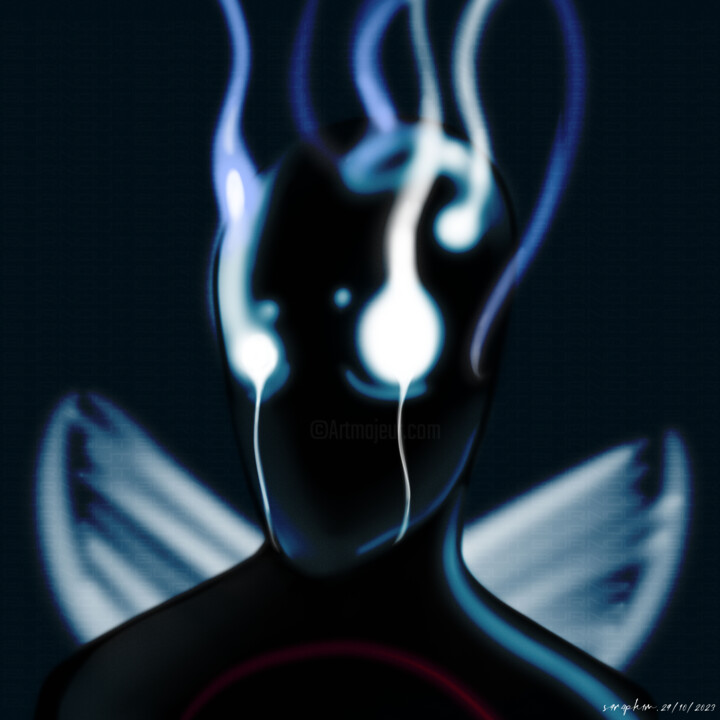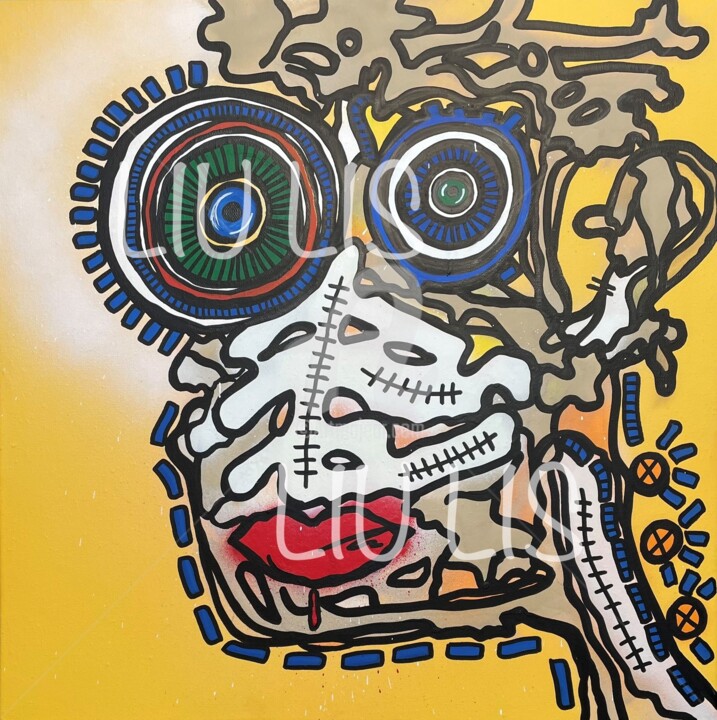2 原创艺术品,限量版和版画:
一种受唯灵论影响的艺术形式,主要是绘画,被称为唯灵论艺术、精神艺术、通灵艺术或通灵绘画。精神艺术对现代主义产生了重大影响,并因此影响了今天的艺术。
Georgiana Houghton 和 Piet Mondrian 是两位著名的精神艺术家。招魂术也为瓦西里·康定斯基、皮特·蒙德里安、卡西米尔·马列维奇和弗朗蒂谢克·库普卡开创性的抽象艺术提供了灵感。霍顿和其他唯灵论艺术家帮助历史学家认识到唯灵论和神秘环境的重要性。
近年来,许多艺术专家现在承认招魂术对现代抽象艺术发展的贡献。领先的当代艺术家仍在与灵性互动。在巴西著名灵媒治疗师约翰上帝的指导下,塞尔维亚表演艺术家玛丽娜·阿布拉莫维奇成为灵媒。许多招魂术元素以及来自美国黑人和澳大利亚原住民传统的元素都出现在她的作品中。
不同类型的精神艺术
尽管许多艺术家都受到唯灵论的影响,但很少有人创造出唯灵论者所说的“精神艺术”。究竟什么是“精神艺术”,可以分为三大类:“沉淀”的艺术作品;灵媒在降神会期间用手绘制的精神肖像;以及声称自己的双手受精神引导的中等艺术家的创作。
灵媒断言,在第一个“沉淀”的案例中,灵魂并没有使用人类艺术家来引导他们的手;相反,他们自己创作了这些画作。在精神艺术的第二个例子中,精神肖像,它非常流行于灵媒素描他们所说的精神肖像,在招魂术鼎盛时期出现在降神会上。灵媒或千里眼所见的描绘一个人的历史、现在和未来的“灵气图”接近于第二种“灵术”。
根据灵性主义者的说法,第三种“精神艺术”包括建筑、雕塑和绘画作品,这些作品是由灵魂指挥艺术家的双手创作的。在第二类(灵魂肖像)中,据说灵魂也经常指挥灵媒的手,但在第三类中,创作的是各种艺术作品,而不是灵魂本身的肖像。
“沉淀”的艺术品
David Duguid(1832-1907)是第一个能够“沉淀”灵画的知名媒介。尽管 Duguid 经常在精神画家的帮助下作画,但在他的降神会期间,他的向导也创作了“直接”(沉淀)绘画。
坎贝尔兄弟居住在纽约 Lily Dale 的精神主义社区,他们可能是最早专门从事沉淀绘画的媒介。尽管不是兄弟,艾伦·坎贝尔(Allen Campbell,1833-1919 年)和查尔斯·舒尔兹(Charles Shourds,1863-1926 年)同住一个家,并一起举行降神会。坎贝尔兄弟在创作他们最著名的肖像画时从未把手放在画布上,其中包括公开完成的拿破仑和亚伯拉罕林肯的肖像画。即使在今天,莉莉戴尔的游客和当地人都声称在坎贝尔的杰作前有过心灵上的邂逅。
Bangs 姐妹 Elizabeth(1859-1920 年)和 May Mary Elvira(1862-1917 年)同样以其对死者的速写肖像而闻名。尽管他们经常被揭露为欺诈行为,但坎贝尔兄弟和邦斯姐妹受到了美国精神主义者社区重要部分的大力保护。
“Swami Laura Horos”,又名 Ann Odelia Diss Debar(1849-1911 年),声称受到几位欧洲古代大师精神的指导,也与精神画有关。 1901 年,德巴尔被判犯有欺诈罪并在她位于伦敦的寺庙中从事不道德的性行为后入狱。
19 世纪最著名的传奇神秘学家、新纪元运动的创始人海伦娜·布拉瓦茨基 (Helena Blavatsky) 夫人 (1831-1891) 在其职业生涯初期也从事灵画的沉淀。
精神写真
维克多·雨果(1802-1855 年)在他位于海峡群岛泽西岛的住所举行的降神会期间创作了他的精神画作。当时,在美国寻找已故亲人肖像的人们也支撑着一个繁荣的招魂术市场。在那里,Wella Percy(1833-1900 年)和 Lizzie Pet Anderson(1839-1896 年;杰出人物)是生活和招魂术方面的合作伙伴。它们是由位于布鲁克林的出版物 Gallery of Spirit Art 推广的,该出版物仅展示在精神协助下创作的艺术品。
出现在降神会上的精神肖像仍然是当前唯心主义场景的一部分,对于那些认为自己认出了已故亲人的人来说,这可能是一种非常感人的经历。弗兰克·利亚(1886-1972)和科勒尔·波尔格(1924-2001)这两位英国精神艺术家在这一领域享誉国际。
数百位精神画家继承了这一传统,包括英国的 Coral Ryder 和 Ann Bridge Davies、加拿大的 Francesca Ferraro 和荷兰的 Angelique van Bezouwen。
灵魂指挥艺术家之手所创造的艺术
练习恍惚绘画的巴西精神主义者经常引导知名画家和雕塑家的作品。何塞·梅德拉多(José Medrado,生于 1961 年)因其催眠丙烯画而闻名于世,因为他在许多精神助手的帮助下创作一件艺术品是多么简单。在恍惚状态下,他在雷诺阿、文森特梵高、克劳德莫奈、马蒂斯、高更、卡萨特、达芬奇、莫里索、马奈等绘画大师的影响下创作了绘画。 Luiz Antônio Gasparetto(1949-2018)在巴西也被称为 Medrado,他在 Degas、Sandro Botticelli、Amedeo Modigliani 和许多其他著名艺术家的指导下亲手绘画和雕刻。
精神建筑的一些例子也属于这一类。通过使用媒介,Iulia Hasdeu(1869-1888 年)展示了她在 Câmpina 著名的“Castle Hasdeu”和她在布加勒斯特的坟墓的建筑计划。比耶拉附近的意大利罗萨扎村于 1880 年至 1899 年间为意大利参议员和共济会成员费德里科·罗萨扎(Federico Rosazza,1813-1899 年)建造,是精神建筑的另一个例子。它由画家 Giuseppe Maffei (1821-1901) 设计。它基于希波的奥古斯丁(354-430 年)的灵魂给他的计划,他一生中从未当过建筑师,还有一位来自托斯卡纳沃尔泰拉的无名男子。
招魂术对当代艺术的影响
近年来,艺术行业对灵性的兴趣重新兴起。博物馆正在对广泛钻研神秘主义和宗教的已故艺术家给予死后关注。 2018-19 年在古根海姆博物馆举办的迷人的 Hilma af Klint 展览成为博物馆历史上参观人数最多的展览,这也许是最著名的例子。 2020 年,惠特尼美国艺术博物馆展出了艾格尼丝·佩尔顿 (Agnes Pelton) 20 多年来的首次个展。
灵性的概念在二十一世纪的众多文化话语中变得越来越重要,包括当代艺术。精神或宗教传统可以在被认为是精神的艺术中暗示或代表。过去,艺术与宗教之间的联系充当了灵性和艺术之间的中介。然而,尽管西欧有组织的宗教衰落了,但在其他文化领域,尤其是艺术领域,与灵性相关的兴趣却有所增加。
Discover contemporary artworks on Artmajeur
Contemporary art is a vibrant constellation of artistic expressions. This creative universe encompasses a wide array of mediums, from paintings, sculpture, and photography to drawing, printmaking, textile art, and digital art, each medium a star shining with its own distinct radiance. Artists use diverse supports and materials to bring their visions to life, such as canvas, wood, metal, and even innovative digital canvases for the creation of virtual masterpieces.
A contemporary painting, for instance, may weave its story through the masterful strokes of acrylic or oil, while a contemporary sculpture might sing its song in the language of stone, bronze, or found objects. The photographic arts capture and manipulate light to produce striking images, while printmaking employs techniques like lithography and screen-printing to produce multiples of a single, impactful image. Textile art plays with fabrics and fibers, whereas digital art pushes the boundaries of creation with innovative technology.
The allure of contemporary art lies in its boundary-pushing nature, its relentless quest for experimentation and its constant reflection of the evolving human experience. This boundless creativity, coupled with its strong social and personal commentary, makes every piece of contemporary art a unique emblem of its time, a mirror held up to the realities and dreams of our complex world. It whispers to us, moves us, provokes thought, and kindles a deep emotional response, stirring the soul of anyone willing to listen. It is, indeed, the language of emotions and ideas, spoken in the dialect of our era.

©2023 Almas Kabyken
Origins and history of contemporary art
The story of contemporary art unfolds in the mid-20th century, marked by seismic shifts in artistic expression. Post-World War II, around the 1950s and 1960s, artists began experimenting beyond traditional confines, challenging the norms of what art could be. This revolutionary epoch birthed myriad new movements and artistic forms such as abstract expressionism, pop art, and minimalism. Paintings, once confined by realism, embraced abstraction, as artists used color and form to express emotions and ideas. Notable periods like the advent of pop art in the late 1950s and early 1960s saw artworks mimicking popular culture and mass media, reflecting society’s shifting focus.
The sculptural arts, too, witnessed a metamorphosis. Sculptors started to experiment with new materials and forms, often creating artworks that interacted with the viewer and the surrounding space, fostering a sense of engagement. Drawing, a timeless practice, also evolved, with artists incorporating innovative techniques and concepts to redefine its role in contemporary art.
Photography, a relatively new medium, emerged as a powerful tool in the contemporary art landscape. Born in the 19th century, it truly came into its own in the latter half of the 20th century, blurring the lines between fine art and documentation. Printmaking, a practice dating back to ancient times, saw renewed interest and experimentation with techniques like lithography, etching, and screen printing gaining prominence.
The realm of textile art expanded dramatically, as artists began to appreciate the versatility and tactile quality of fabric and fibers. Artists began using textiles to challenge the boundaries between fine art, craft, and design.
The dawn of digital technology in the late 20th century heralded a new age for contemporary art. Digital art emerged as artists started leveraging new technologies to create immersive, interactive experiences, often blurring the line between the virtual and the physical world.
Through these transformative periods, the essence of contemporary art has remained the same: a dynamic, evolving reflection of the times we live in, continually pushing boundaries and embracing the new, always questioning, always exploring.

©2022 Liu Lis
Evolutions of theses contemporary works in the art market
As we navigate through the 21st century, the dynamic landscape of contemporary art continues to evolve and expand, reflecting our ever-changing world. Contemporary paintings, once primarily confined to two-dimensional canvases, now embrace a multitude of forms and techniques, ranging from mixed media installations to digital creations, each piece a rich a weaving of thoughts, emotions, and narratives. Sculpture, too, has ventured far beyond traditional stone and bronze, with artists incorporating light, sound, and even motion, embodying the ephemerality and flux of the modern world.
Photography, in the hands of contemporary artists, has expanded its horizons, seamlessly blending with digital technology to create breathtaking imagery that challenges our perception of reality. Drawing, as well, has transcended the borders of paper, incorporating multimedia elements and exploratory techniques to redefine its role in the artistic discourse. Printmaking continues to flourish, with contemporary artists using traditional methods in innovative ways to deliver potent social and personal commentaries.
Textile art, once considered a craft, now holds a prominent place in the contemporary art world, with artists using it to explore issues of identity, tradition, and cultural heritage. Meanwhile, digital art, the newest member of the contemporary art family, has revolutionized the way we create and interact with art, presenting immersive experiences that blur the boundary between the virtual and the physical.
These diverse forms of contemporary art hold significant value in the current art market, not only due to their aesthetic appeal but also their ability to encapsulate and communicate complex ideas and emotions. Collectors, curators, and art lovers worldwide seek these works, drawn to their inherent dynamism, their innovative use of materials, and their eloquent expressions of our shared human experience. As a testimonial to our times, these contemporary artworks encapsulate the pulse of our society and the resonance of individual voices, forever etching our collective narrative into the annals of art history.
Famous Contemporary Artists
As we delve into the vibrant realm of contemporary art, we encounter an array of artists who shape this dynamic field. Each a master in their medium - painting, sculpture, photography, drawing, printmaking, textile, or digital art - they push artistic boundaries, reflecting our era and challenging perceptions. Let’s explore these remarkable contributors and their groundbreaking works.
1. Gerhard Richter - Known for his multi-faceted approach to painting, Richter challenges the boundaries of the medium, masterfully oscillating between abstract and photorealistic styles. His works, whether featuring squeegee-pulled pigments or blurred photographic images, engage in a fascinating dialogue with perception.
2. Jeff Koons - A significant figure in contemporary sculpture, Koons crafts monumental pieces that explore themes of consumerism, taste, and popular culture. His iconic balloon animals, constructed in mirror-polished stainless steel, captivate with their playful yet profound commentary.
3. Cindy Sherman - An acclaimed photographer, Sherman uses her lens to explore identity and societal roles, particularly of women. Renowned for her conceptual self-portraits, she assumes myriad characters, pushing the boundaries of photography as a medium of artistic expression.
4. David Hockney - Hockney, with his prolific output spanning six decades, is a pivotal figure in contemporary drawing. His bold use of color and playful exploration of perspective convey an intoxicating sense of joy and an unabashed celebration of life.
5. Kiki Smith - An innovative printmaker, Smith’s work explores the human condition, particularly the female body and its social and cultural connotations. Her etchings and lithographs speak to universal experiences of life, death, and transformation.
6. El Anatsui - A master of textile art, Anatsui creates stunning tapestry-like installations from discarded bottle caps and aluminum scraps. These shimmering, flexible sculptures blend traditional African aesthetic with contemporary art sensibilities, speaking to themes of consumption, waste, and the interconnectedness of our world.
7. Rafael Lozano-Hemmer - A leading figure in digital art, Lozano-Hemmer utilizes technology to create interactive installations that blend architecture and performance art. His work, often participatory in nature, explores themes of surveillance, privacy, and the relationship between people and their environments.
Notable contemporary artworks
The contemporary art landscape is a dynamic patchwork of diverse expressions and groundbreaking ideas, each artwork a unique dialog with its audience. Here are a selection of some renowned contemporary artworks, spanning various media such as painting, sculpture, photography, drawing, printmaking, textile art, and digital art, that have profoundly influenced this vibrant movement.
"Cloud Gate" by Anish Kapoor, 2006 - This monumental stainless steel sculpture, also known as "The Bean," mirrors and distorts the Chicago skyline and onlookers in its seamless, liquid-like surface, creating an interactive experience that blurs the line between the artwork and the viewer.
"Marilyn Diptych" by Andy Warhol, 1962 - An iconic piece of pop art, this silkscreen painting features fifty images of Marilyn Monroe. Half brightly colored, half in black and white, it reflects the dichotomy of celebrity life and its influence on popular culture.
"Rhein II" by Andreas Gursky, 1999 - This photographic artwork, a digitally-altered image of the Rhine River, is celebrated for its minimalist aesthetic. It strips the landscape to its bare essentials, invoking a sense of tranquility and vastness.
"Black Square" by Kazimir Malevich, 1915 - A revolutionary painting in the realm of abstract art, this piece, featuring nothing more than a black square on a white field, challenges traditional notions of representation, symbolizing a new era in artistic expression.
"Puppy" by Jeff Koons, 1992 - This giant sculpture, a West Highland Terrier blanketed in flowering plants, explores themes of innocence, consumer culture, and the interplay between high art and kitsch. It’s a delightful blend of traditional sculpture and garden craft.
"Re-projection: Hoerengracht" by Ed and Nancy Kienholz, 1983-1988 - A room-sized tableau representing Amsterdam’s red-light district, this work combines elements of sculpture, painting, lighting, and found objects. It engages viewers in a stark commentary on commodification and objectification.
"Untitled" (Your body is a battleground) by Barbara Kruger, 1989 - This photomontage, combining black-and-white photography with impactful text, explores issues of feminism, identity, and power. Its potent, confrontational message is a prime example of the power of text in contemporary visual art.
"For the Love of God" by Damien Hirst, 2007 - This sculpture, a platinum cast of a human skull encrusted with 8,601 diamonds, probes themes of mortality, value, and the human fascination with luxury and decadence. It’s a compelling blend of macabre and magnificence.
"Physical impossibility of Death in the Mind of Someone Living" by Damien Hirst, 1991 - This artwork, featuring a tiger shark preserved in formaldehyde, blurs the line between traditional sculpture and biological specimen. It prompts viewers to contemplate mortality and nature’s ferocity.
"One and Three Chairs" by Joseph Kosuth, 1965 - A piece of conceptual art, it presents a physical chair, a photograph of a chair, and a dictionary definition of a chair, thus exploring the relationship between language, picture, and referent in art.
These pieces, in their diversity, exemplify the rich tapestry of contemporary art, each piece a unique commentary on our world and a testament to the limitless potential of creative expression.


